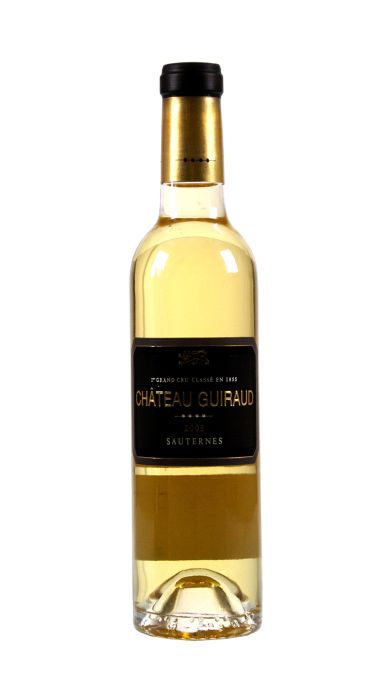Need Help Finding the right wine?
Your personal wine consultant will assist you with buying, managing your collection, investing in wine, entertaining and more.
By continuing, you agree to our privacy policy, consent to cookies, and confirm you are 21 or older.
I have read and agree to the Privacy Policy and Terms of Service.
YOU MUST BE 21 OR OLDER TO CONTINUE
NYC, Long Island and The Hamptons Receive Free Delivery on Orders $300+
Cool Wine Shippers Now Available.
Checkout using your account
Checkout as a new customer
Creating an account has many benefits:

2005 Guiraud
97 WS
Wine Spectator | 97 WS
| Type of Wine | Dessert |
|---|---|
| Varietal |
Proprietary Blend
: Proprietary Blend is a general term used to indicate that a wine is comprised of multiple grape varietals which are either “proprietary” to the winery or is blended and does not meet the required maximum or minimum percentage of a particular varietal. This also is the case for the grape’s place of origin, especially for region, appellation or vineyard designated wines. There are endless examples of blended wines which are labeled as “Proprietary Blend” and in conjunction with each region’s stipulated wine laws and regulations makes for a vast blanket for wines to fall into. Perhaps the simplest example is California; if a wine is to be labeled as Napa Valley Cabernet Sauvignon, it is required to have at least 75% of the varietal (Cabernet Sauvignon) and 85% of the fruit must be cultivated from the Napa Valley wine district. If the wine does not meet the requirements, it is then labeled as Proprietary Blend. |
| Country |
France
: Wine is the lifeblood that courses through the country of France, pulsing with vigorous pride and determination. Viticulture is not just a hobby or an occupation in France; it is a passion, a cherished tradition that has been passed down through generations of wine stained hands. Winemaking is a beloved art that has been ingrained in the culture, an aptitude instilled in sons by fathers and the hallmark for which France’s reputation was built, allowing it to be renowned as, arguably, the most important wine producing country in the world. For centuries, France has been producing wines of superior quality and in much greater quantity than any other country in the world. It boasts some of the most impressive wine regions, coveted vineyards and prestigious wines on earth. The regions of Bordeaux, Burgundy, Rhone, Sauternes and Champagne have become the benchmark, for which others aspire to become. Legendary producers such as Chateaux Margaux, Domaine De La Romanee Conti, Chapoutier, d’Yquem and Dom Perignon are idolized world-wide. France has stamped its name on nearly every style of wine, from the nectar-like sweet Sauternes to hedonistic Chateauneuf Du Papes classic Bordeaux and Burgundy, to its sparkling dominance in Champagne. Many of the most infamous grape varietals in the world, such as Cabernet Sauvignon, Merlot, Pinot Noir and Chardonnay originated in France and are not only beloved, but utilized in the creation of some of the greatest wines on earth. French wine production commands the attention of the wine market year after year. With over 860,000 hectares under vine, and numbers close to 50 million hectoliters of wine produced annually, France dominates the market and sets the standard for not only product quality, but also quantity. France’s many contributions to the world of wine have been absolutely indispensable. The country is the originator of the term “Premier Cru,” coined the term Terroir (a French term so complex there is no literal translation) and has laid the blueprint for a structured appellation system, which others have implemented in their own countries. French vineyard techniques and winemaking practices are mimicked world-wide. California vintners have been replicating Rhone style wines for decades, South America has adopted the French varietal of Malbec and countries around the world are imitating Burgundian styled Chardonnay and Pinot Noir. With vast diversity in terroir, France is home to some of the most hospitable winegrowing locations on earth. The combination of topography, geology, climate, rainfall and even the amount of sunlight combined with the long historical tradition of winegrowing and making, has allowed the vintners of France to not only hone their skills, but learn from nature to create a product that like the world in which it resides… is very much alive. |
| Region |
Sauternes
: The white wines of Bordeaux are sometimes sadly looked over, as the region is primarily known for their almost absurdly powerful and delicious reds. However, if you like a refreshing, sweet treat on a late summer evening or you wish to complete your journey through Bordeaux's finest wines, you should not skip a Sauternes bottle or two. Made from a carefully balanced mixture of Semillon, Sauvignon Blanc and Muscadelle grape varietals, this wine boasts an almost supernatural sweetness. This sugary nature can be attributed to the presence of noble rot that can cause the grapes to visually resemble raisins in a way. We would completely understand if a single taste of fine Sauternes brought visible tears of joy to your eyes, as the flavor is just that magnificent. As you swirl the liquid gold in your mouth, an orchestral performance echoes on, with a grounding double bass of honey and the sharpness and acidity of a passionate violin solo. Notes of peach, apricot and nut punctuate the experience, sending you sky-high with inspiration and pure, emotional bliss. Let us open the door to a whole new world together. |
| Appellation | Sauternes |
| Cru | Premier Cru |
| Producer | Chateau Guiraud |
|---|
Need Help Finding the right wine?
Your personal wine consultant will assist you with buying, managing your collection, investing in wine, entertaining and more.